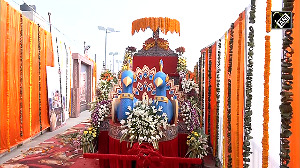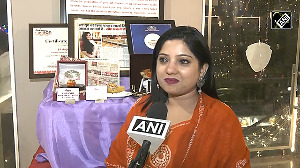Part 1: 'You cannot resolve Kashmir on religious lines'
In the first part of her interview with rediff India Abroad's Managing Editor Aziz Haniffa, Navnita Chadha Behera, the author of a definitive guide to the Kashmir crisis Demystifying Kashmir, spoke of how her book tries to give a more nuanced look at the Kashmir.
In the second and last past she tells us how India and Pakistan can move forward on the Kashmir issue but warns that it will be a painstaking process with many pitfalls ahead.
If there's another major terrorist operation linked to a Pakistan-based group, the process could unravel pretty fast.
Yes, that could be one more caution too. But I was pleasantly surprised by the Samjhauta [Express] case [despite an attack on the peace train between the two countries, mutual criticism was muted]. That was an attempt to scuttle the process. But both sides rode that bump. The road is full of these potholes. But Musharraf is now coming to realise that the militants are [continually going to create trouble].
The peace process earlier survived the Mumbai blasts, too. Does this indicate that Musharraf and the Inter-Services Intelligence have given up their low-intensity proxy strategy, and are the militants striking out on their own to wreck the burgeoning understanding between India and Pakistan?
No -- very categorically no. They can't give up this completely because that's the only leverage they have against India. What they are doing right now is keeping it under control. They are also realising that they can't constantly maneuver it -- that it's going to come back, like chickens coming home to roost.
That's why he [Musharraf] needs something to show that the process will still deliver if he gave up the [cross-border terrorism] card. So, I wouldn't say he has already given it up.
Is there also a danger that there could be an Al Qaeda contamination of the Pakistan-based militant groups -- maybe that has already happened -- and an overpowering of this militancy network?
Absolutely. They all swim in the same water. The interesting thing is that Americans are also beginning to finally realise that, too. You can't distinguish between Al Qaeda, the Lashkar-e-Tayiba and Jaish-e-Mohammed. They all end up connecting with each other.
Pakistan has always been asking the US to mediate the Kashmir dispute, but India rejects mediation though it doesn't mind facilitation. What role do you see for the US here?
There's always this simplistic view in Washington that although Kashmir is now on the backburner, that both countries possess nuclear weapons makes the area the most dangerous in the world.
The role the US will play is very low-key, nudging the two countries to just keep going. From the US point of view, one thing they don't want to see in South Asia is another war. That's their bottom line. But so long as that is done, they will go along with whatever solution India and Pakistan come up with. What they are effective in doing is, for example, the bus [between India and Pakistan]; initially, we ran into a deadlock because Pakistan insisted that for people to be able to travel in the buses they would need UN-approved documents. India said nothing doing, and it was actually backdoor pressure from the US that made Pakistan give up that stand very quietly. We didn't read much about that in the press.
But the moment they come up-front and say, 'Okay, we are going to tell you guys to do this and you guys to do that,' the Indians will back off. That's one lesson the Americans have learnt and so I don't think they are going to try doing that.
Former Kashmir chief minister Mufti Mohammed Sayeed recently said he saw a silver lining in terms of demilitarisation in Kashmir, but Chief Minister Ghulam Nabi Azad quickly dismissed prospects of immediate demilitarisation. Do you feel a tangible and massive demilitarisation is a major criterion for the process to move forward?
It's a measure of timing. I don't see it happening right now. There are concerns there. There are too many soft targets in Kashmir. If you were to demilitarise, it's the civilians who will suffer, not the leadership, even though they are taking this hyper-decibel stand.
You have got to keep in mind the interests of the civilians and [their] safety and security. That is why demilitarisation won't happen right now. But I think it's a matter of months. What is gradually happening is that the army is giving up its duties. In some sectors the army has already moved out. But it takes time to train people to take over the army's duties.
It's probably going to happen but it won't be a spectacular diffusion, but a slow-motion, gradual process, district by district, over the next six months to a year. But not in precisely the manner that Pakistan is asking.
In the interim, I guess it doesn't help if there are cases of human rights violations and encounter killings as were reported recently?
That's something we really need to get our act together on. These recent [encounter] killings were a complete disaster. That's one thing that really alienates the common people, and if Kashmir is basically a battle of winning hearts and minds, then that's certainly not the way to go about it. We have made a lot of progress of human rights, on custodial killings. There is a lot more consciousness, there is a lot of penalising that has happened against army officers, police officers. But that's something that we really need to be very proactive on.
You mentioned that during your field work and travel you saw the civilians' weariness with the militants who purportedly represent them.
Absolutely. They are fed up. They are looking for a political face-saving way out where they can get on with their lives. All they are saying is that we have sacrificed so much, what do we get in return? How do we ensure that our political rights are protected?
That's the central message of the book: understand the conflict as an issue of the political rights of people who live in both parts of Kashmir and you will be much closer to resolving the conflict.
If you tie it down to territory or ideology, then you are tying yourself up in knots; it becomes a zero-sum game. But if you look at it as a question of political rights of people, then there is a way out that satisfies everybody -- people in Jammu and Kashmir and in Pakistan -- and that's what we need.
Are you convinced Manmohan Singh's government is serious about resolving this issue and genuinely wants to take the wishes of the Kashmiri people -- the ones who feel alienated -- into consideration in whatever resolution they negotiate?
Yes, I would say the Manmohan Singh government is genuine in its efforts to resolve this issue. The attempts on the roundtable were very good. They haven't really worked out, but Manmohan Singh is constantly trying to find ways to listen to what the people of Jammu and Kashmir have to say. The trouble again is that there is no sole spokesman here. The field is out wide. How do you get all these guys on board on the same platform? So there are practical problems, but in terms of motivation, in terms of the genuineness of the intentions, I would definitely say, yes.





